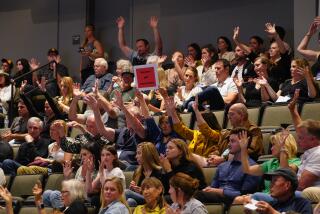RIOT AFTERMATH : Caucasian Club Leader Decries Ethnic Tensions
- Share via
LONG BEACH — In the wake of the riots and racial tensions that racked Long Beach, the president of the Caucasian Ancestry Club at Polytechnic High School says the school should do away with all race-designated clubs--including his own.
“It just causes more tension,” said Scott Wright, a Polytechnic junior. “(The school) should not have any racial things at all.”
Other students, however, argue that race- or culture-oriented clubs, including the Caucasian Ancestry Club, serve to ease tensions at the 3,700-student school.
Polytechnic has about 30 of the organizations, ranging from an African-American club to a Polynesian club to an Egyptian club. The school also sponsors a variety of racial or culturally oriented activities. For example, the school’s student International Ambassadors--the Polytechnic equivalent of a homecoming court--are selected from five officially designated racial groups: Latino, African-American, Asian, Pacific Islander and Caucasian.
The Caucasian Ancestry Club was the subject of a sometimes heated debate last month at the Polytechnic Community Interracial Council, an advisory group of students, teachers, administrators and parents. Some council members thought that the club’s name was inflammatory, and that the club might be confused with a white supremacy group. Others objected to the club under any name.
But after club supporters argued that white students, who constitute less than a third of the student body, should be given the same opportunity to form a cultural club as other students, the council voted 12 to 10 to allow the club. Like all student associations, the Caucasian Ancestry Club is open to any student regardless of race.
Administrators and students agree that the Caucasian club, which has about 20 members, has caused no problems. Although racial tensions in general have heightened since the riots, students say, there have been no serious racial incidents at the school.
But Wright, 16, says, “There seem to be so many racial tensions that I think we’d be better off without them (the racial or cultural clubs). They just separate us.”
Wright acknowledged that eliminating such clubs would mean eliminating the Caucasian club too.
“If they have to go, we have to go,” he said. He added that there are no plans to disband the club, however.
Other students disagree that race or cultural clubs are a divisive element at the school.
“There is a lot of tension at Poly right now,” said senior Juan Torres, co-chairman of the Community Interracial Council. “But if we were to remove all the ethnic events and clubs, it would take away the whole source of Poly’s diversity.” He added that the clubs represent “unity, not division.”
“A lot of people are concerned that we should come together,” said Mike Cipra, a senior who spoke in favor of the Caucasian club’s right to exist at the Community Interracial Council meeting last month. “But I also think people should be able to learn about their heritage” through membership in the clubs.
Barbara Lindquist, activities director at Poly, said it is unlikely that the school would do away with racial or cultural clubs, since the students themselves make most of the decisions about school clubs and activities.
“I don’t think that would ever happen,” Lindquist said.
Lindquist acknowledged that “there is some tension” involving racial or cultural clubs because some students don’t feel comfortable participating in activities organized by students of other racial or cultural groups. But she said that next year the school plans to have the presidents of all the clubs meet regularly to try to work out any problems.
More to Read
Sign up for Essential California
The most important California stories and recommendations in your inbox every morning.
You may occasionally receive promotional content from the Los Angeles Times.













